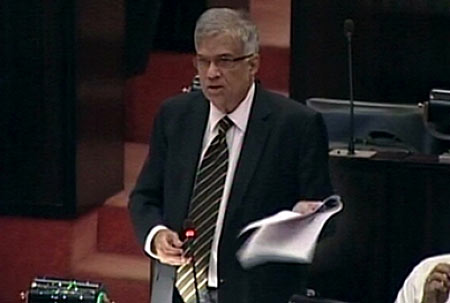Government set to abolish strict foreign exchange regulations

Sri Lanka on Thursday announced plans to lift six-decade-old restrictions on foreign exchange flows and allow free transfer of money in and out of the island, to encourage investment in the struggling economy.
The island tightly controls foreign currency transactions under a 1953 law that does not allow the free repatriation of capital, in an effort to protect its modest foreign reserves.
Under the present strict rules, exporters must bring back their foreign earnings within a short period of time or face penalties. Analysts say the policy deters investors.
“We can remove exchange controls before the next budget (in November),” Prime Minister Ranil Wickremesinghe said in parliament.
“We are strong enough to do that. We have that confidence.”
Last week, Sri Lanka received the first tranche of a $1.5 billion bailout from the International Monetary Fund (IMF) to shore up the island’s economy, left reeling after a spending spree by the new government.
The premier said Sri Lanka’s foreign reserves were expected to double to $12 billion by the end of this year thanks to loans and grants from China, India and Japan.
The island also plans to raise about $4.2 billion with two bond issues, Wickremesinghe said.
The announcements came during a parliamentary session in which the opposition moved a no-trust resolution against Finance Minister Ravi Karunanayake accusing him of arbitrarily raising taxes. Earlier this month, Karunanayake sharply raised taxes on cars shortly after announcing an increase in the island’s value added tax from 11 to 15 per cent.
But the no-confidence move was defeated by 94 votes in the 225-member assembly, where the ruling party commands a two-thirds majority.
Soon after President Maithripala Sirisena’s government came to power in January last year, the finance minister led a spending spree to implement election pledges of higher public sector salaries and reduced taxes.
However, the country soon found itself in a balance of payments crisis.
The IMF noted last week that Sri Lanka’s economy was under strain from an increasingly difficult external environment and has warned Colombo that it should increase tax collection.
Sri Lanka enjoyed blistering economic growth rates averaging more than eight per cent for two years after a prolonged civil war ended in 2009.
But the pace of expansion has since slowed, falling to 4.8 per cent in 2015, down from 4.9 per cent in the previous year, according to official data.
(Source: AFP)

Latest Headlines in Sri Lanka
- UN pledges support for Sri Lanka’s industrial and SME development March 13, 2025
- Former Boossa Prison Superintendent shot dead in Akmeemana March 13, 2025
- Police search Sagala Ratnayaka’s residence amid hunt for IGP Deshabandu Tennakoon March 13, 2025
- Another Middeniya triple murder suspect arrested at BIA while fleeing March 13, 2025
- Court of Appeal to rule on IGP Tennakoon’s arrest warrant on March 17, 2025 March 12, 2025



encourage investment in the struggling economy?
The premier said Sri Lanka’s foreign reserves were expected to double to $12 billion by the end of this year thanks to loans and grants from China, India and Japan. you going
Are you sure what you are going to do Mr Prime Minister
That’s fantastic news for a Banana Republic which survives on handouts from the IMF.
Once foreign exchange restrictions are removed, the Komis Karayas will be able to transfer their earnings anywhere including AUSTRALIA where the progeny of the up and coming rich are living.
CB Gov, Bond Mahendran and SIL will dance in glee; the world is their stage; Forbes Rich Man list, here I come.
When this guy finish his term there want be anything left in the country. It is simply like that.
Ranil ought to consider legalising the growth, export and use of Cannabis. With falling demand for our best teas and natural rubber Cannabis would prove to be the next best crop. With the EU plans to lift the ban on Cannabis we must seize the initiative to become leading exporter of Cannabis after Colombia.
With it we will have no problem with the balance of payments contrary to this perennial problem Ranil will be able to bridge budget deficit. The minor export crop department should dedicate itself to doing basic research and to improve the quality of ganja they should be authorised to import superior hybrids
which is sold at about $20 a seed but the yields and quality will compensate this cost. This is cheap considering some of top hybrid tomato (burpee) sells at about $1000 a kilo.
Ranil ought to pioneer the first global Cannabis conference and be the envy of hawks and doves (pigeons) and peace initiatives should be labelled peace trhrough poy
Zama,
Thank you, most appreciated.
Cannabis and Marijuana are the solutions to the problems and conflicts of the worlds.
Unfortunately, the satrap’s who live in a world of tyranny and ostentatious splendour, lack the common touch.